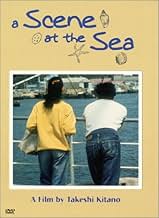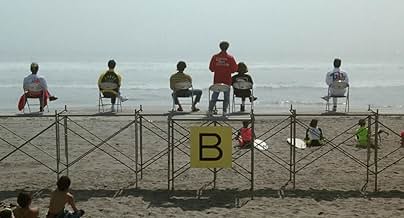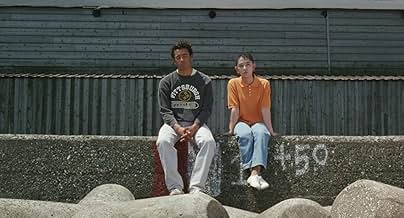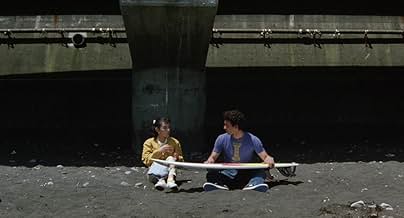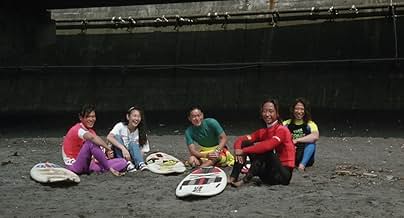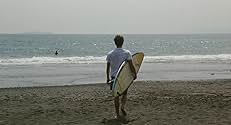IMDb रेटिंग
7.5/10
7.1 हज़ार
आपकी रेटिंग
एक युवा, सुनने में असमर्थ, और उदास रहने वाले दंपत्ति का जीवन तब पूरा हो जाता है, जब लड़का सर्फबोर्डिंग में रुचि लेने लगता है.एक युवा, सुनने में असमर्थ, और उदास रहने वाले दंपत्ति का जीवन तब पूरा हो जाता है, जब लड़का सर्फबोर्डिंग में रुचि लेने लगता है.एक युवा, सुनने में असमर्थ, और उदास रहने वाले दंपत्ति का जीवन तब पूरा हो जाता है, जब लड़का सर्फबोर्डिंग में रुचि लेने लगता है.
- पुरस्कार
- 11 जीत और कुल 6 नामांकन
फ़ीचर्ड समीक्षाएं
Ano Natsu Ichiban Shizukana Umi/A Scene at the Sea(1992) is about a young male deaf-mute who after picking up an old surfboard has ambitions of becoming a champion surfer. Ambition becomes an important theme in this simple and tender romantic comedy. Shigeru unlike Masaki of 3-4x Jugatsu/Boiling Point(1990) wants to do something with his life and has ambitions for something successful. Ambition of a major character in a Takeshi Kitano film plays an essential role in Kids Return(1996).
Moves away from the Yakuza world of Violent Cop(1989) and Boiling Point(1990). Takeshi Kitano is no different from some directors like John Woo or Sam Peckinpah in following up an intense violent film with a charming simple film. Evident that Takeshi Kitano is a versatile filmmaker who's not a one trick pony. A Scene at the Sea(1992) returns to the director's roots as a famed comedian of Japanese television.
Driven not by the surfing portion of the story but by the silent and expressionistic love between Shigeru and another deaf-mute person named Takako(woman). Their love for each other reaches a metaphysical level where words would do little justice in expressing the feelings of love. The expressionistic relationship between Shigeru and Takako resembles the almost silent but touching relationship of Nishi and his wife in Hana-Bi/Fireworks(1997). The feelings of love between Shigeru and Takako seems simple on the surface but is much more confound and complex once the viewer goes deep into the core of the apple.
A Scene at the Scene is a wonderful film because it devoids of the usual cliches that typify the American beach and surf movie. Takeshi Kitano reinvents the American Surf film into something more Japanese and profound. Has none of the annoying aspects that characterize the American surf film. Overlooked as a film by one track minded critics and even mainstream audiences because of its take your time pace and subject.
If it weren't for most of the characters being able to talk then A Scene at the Sea(1992) would be a silent film. The first line of dialogue does not come into play until five minutes into A Scene at the Sea(1992). The Closet Takeshi Kitano has come to making a silent picture(Combines the aspects of the silent and sound pictures). I would enjoy seeing Takeshi Kitano take on a project like a silent film because he could finds ways of reinventing this old style of filmmaking.
Except for one moment there isn't any violence in sight which is unusual for a Kitano feature film. The one violent scene is only brief and is about a minute at best. The only other completely non violent feature Takeshi Kitano has done besides A Scene at the Sea(1992) is the sex comedy, Getting Any(1994). Interested in the peaceful aspects of human behavior instead of its violent counterparts.
Volume three of the Beat Takeshi series and the first without Takeshi Kitano as an actor. Not acting here gives Takeshi Kitano more focus on the directing and editing chores. His acting style is filtered through the acting performances of Kuroudo Maki and Hiroko Oshima. A mature direction with focus on the simplicities of movie making.
A Scene at the Sea(1992) uses the favorite Kitano locations of the beach and the sea more regularly than in any other film by him except Sonatine(1993) and Fireworks(1997). The bulk of the story takes place in beaches or near the sea. The only other filmmaker I can think of who used the beach and the sea as part of his landscapes is Italian filmmaker, Mario Bava. Shigeru is someone who's at home at the beach and feels a sense of personal happiness when working hard to become the best surfer he can be.
The ending was very perplexing when I first saw this movie because of the merger of the past and present. The final two scenes have an air of Alain Resnair with the non linear use of flashback and present imagery. Feels like a moment out of a Alain Resnair film because things cease to make sense and becomes a series of lyrical images. Ano Natsu Ichiban Shizukana Umi/A Scene at the Sea(1992) was the first director-film composer collaboration between Takeshi Kitano and Jo Hisaishi.
Some of the acting method resembles the Antonin Artaud style of acting which is characterized by bodily expressions being more important than words. The silent performances of Kuroudo Miki and Hiroko Oshima are examples in the Artaud idea of metaphysical acting. Like in his work for the theater, two of the characters in A Scene at the Sea(1992) are mute(the plays of Artaud always included someone who doesn't speak with words literally but with visual expression). What gives the acting of the two main characters an Artaud flavor is the reliance of the expression of the senses(Imagery) over the expressions of the mind(words).
Moves away from the Yakuza world of Violent Cop(1989) and Boiling Point(1990). Takeshi Kitano is no different from some directors like John Woo or Sam Peckinpah in following up an intense violent film with a charming simple film. Evident that Takeshi Kitano is a versatile filmmaker who's not a one trick pony. A Scene at the Sea(1992) returns to the director's roots as a famed comedian of Japanese television.
Driven not by the surfing portion of the story but by the silent and expressionistic love between Shigeru and another deaf-mute person named Takako(woman). Their love for each other reaches a metaphysical level where words would do little justice in expressing the feelings of love. The expressionistic relationship between Shigeru and Takako resembles the almost silent but touching relationship of Nishi and his wife in Hana-Bi/Fireworks(1997). The feelings of love between Shigeru and Takako seems simple on the surface but is much more confound and complex once the viewer goes deep into the core of the apple.
A Scene at the Scene is a wonderful film because it devoids of the usual cliches that typify the American beach and surf movie. Takeshi Kitano reinvents the American Surf film into something more Japanese and profound. Has none of the annoying aspects that characterize the American surf film. Overlooked as a film by one track minded critics and even mainstream audiences because of its take your time pace and subject.
If it weren't for most of the characters being able to talk then A Scene at the Sea(1992) would be a silent film. The first line of dialogue does not come into play until five minutes into A Scene at the Sea(1992). The Closet Takeshi Kitano has come to making a silent picture(Combines the aspects of the silent and sound pictures). I would enjoy seeing Takeshi Kitano take on a project like a silent film because he could finds ways of reinventing this old style of filmmaking.
Except for one moment there isn't any violence in sight which is unusual for a Kitano feature film. The one violent scene is only brief and is about a minute at best. The only other completely non violent feature Takeshi Kitano has done besides A Scene at the Sea(1992) is the sex comedy, Getting Any(1994). Interested in the peaceful aspects of human behavior instead of its violent counterparts.
Volume three of the Beat Takeshi series and the first without Takeshi Kitano as an actor. Not acting here gives Takeshi Kitano more focus on the directing and editing chores. His acting style is filtered through the acting performances of Kuroudo Maki and Hiroko Oshima. A mature direction with focus on the simplicities of movie making.
A Scene at the Sea(1992) uses the favorite Kitano locations of the beach and the sea more regularly than in any other film by him except Sonatine(1993) and Fireworks(1997). The bulk of the story takes place in beaches or near the sea. The only other filmmaker I can think of who used the beach and the sea as part of his landscapes is Italian filmmaker, Mario Bava. Shigeru is someone who's at home at the beach and feels a sense of personal happiness when working hard to become the best surfer he can be.
The ending was very perplexing when I first saw this movie because of the merger of the past and present. The final two scenes have an air of Alain Resnair with the non linear use of flashback and present imagery. Feels like a moment out of a Alain Resnair film because things cease to make sense and becomes a series of lyrical images. Ano Natsu Ichiban Shizukana Umi/A Scene at the Sea(1992) was the first director-film composer collaboration between Takeshi Kitano and Jo Hisaishi.
Some of the acting method resembles the Antonin Artaud style of acting which is characterized by bodily expressions being more important than words. The silent performances of Kuroudo Miki and Hiroko Oshima are examples in the Artaud idea of metaphysical acting. Like in his work for the theater, two of the characters in A Scene at the Sea(1992) are mute(the plays of Artaud always included someone who doesn't speak with words literally but with visual expression). What gives the acting of the two main characters an Artaud flavor is the reliance of the expression of the senses(Imagery) over the expressions of the mind(words).
Having recently seen and loved Zatoichi, the Blind Swordsman, I became interested in seeing his other work. So I started with this movie, which had been praised to the sky.
Slow? Measured pacing? Grass grows faster. And why doesn't a contemporary Japanese deaf couple know sign language? This film's emotion is so subtle that white bread seems interesting.
I am a lover of foreign and independent films. But the high praise that this one has received has me stumped. It seems to me that the director has tried too hard to create something unusual.
Incredible from the get-go.
Oh, well, I'll keep trying. I shall now watch Kids Return.
Slow? Measured pacing? Grass grows faster. And why doesn't a contemporary Japanese deaf couple know sign language? This film's emotion is so subtle that white bread seems interesting.
I am a lover of foreign and independent films. But the high praise that this one has received has me stumped. It seems to me that the director has tried too hard to create something unusual.
Incredible from the get-go.
Oh, well, I'll keep trying. I shall now watch Kids Return.
10gray4
Takeshi Kitano has made his reputation through a string of splendid Yakuza films, whose stylised violence is tempered with humour. All the more of a surprise, then, to come across this early Kitano in a totally different style. The storyline is minimal. A young deaf-mute garbage collector finds a broken surfboard, repairs it and becomes obsessed with surfing. His devoted girlfriend follows him - literally - everywhere, six paces behind him, dutifully folding up his discarded clothes while he is surfing.
Surely you can't make a film with so little action and no dialogue from the main characters! Kitano does, triumphantly. This is a heart-warming film, without being cloying. The relationship between the two central characters is drawn beautifully, using only their eyes and occasional smiles. They hardly ever even touch. But by the end of the film you feel that you know them and your heart goes out to them, in a film with touches of the great Japanese master Ozu. The music complements the film's moods superbly, and augments the atmospheric stillness that pervades this Japanese masterpiece. A must-see movie.
Surely you can't make a film with so little action and no dialogue from the main characters! Kitano does, triumphantly. This is a heart-warming film, without being cloying. The relationship between the two central characters is drawn beautifully, using only their eyes and occasional smiles. They hardly ever even touch. But by the end of the film you feel that you know them and your heart goes out to them, in a film with touches of the great Japanese master Ozu. The music complements the film's moods superbly, and augments the atmospheric stillness that pervades this Japanese masterpiece. A must-see movie.
10jowang
The silence is beautiful and poetic. The wave of the sea is the heartbeats of the hearing-impaired young couple, that only the people with beautiful mind can hear. The audience view the story from a distance but is consciously involved with things go. This is the best film from Japanese comedian/director Takeshi Kitano.
This film shows that sensitive side of Takeshi Kitano's films. He can really create some beautiful and atmospheric scenes. Sadly, this film didn't have enough to amaze me. I know many people say this is an absolutely beautiful film, and while I cannot deny the beauty of some scenes, it can drag a lot a feel dull at times.
My main issue was with the main characters. It's supposed to be a love story, but I just didn't feel their connection was believable. It was as if we are expected to see them sitting beside each other day after day as some kind of big romantic connection. Now I understand that he is deaf and, while it sometimes seems like she isn't, the girl is deaf too, making this silent and beautiful connection appear. But I just at times felt like they just happened to beside each-other. They barely ever make any eye contact. You never truly feel that silent love for each other. It felt similar to how when Takeshi Kitano is acting, he has a stone face, but in the case of these characters it doesn't work. Kitano can do his usual emotionless face yet somehow convey a character underneath that face with emotions. The two leads in this cannot do that, and it hurts the film greatly. The film also suffers from being extremely repetitive. We see people walking down the same road numerous times, see the same surfing scenes again and again without any noticeable differences. I wouldn't have minded if you we're seeing him improve his surfing skills each time, but I felt like he didn't really. Even at the end he seemed... okay. His surfing was just good. I didn't know whether that was the point or if he was supposed to actually look really good at it. The surfing feels pointless if there is not a big change in skill. I just felt like I watched a movie about two deaf people who sit around and don't look at each other, and on of them becomes mediocre at surfing. Although I will say the soundtrack is amazing. The music gave me the feelings that I wish the characters would have. It helped add emotional impact to scenes that, without the aid of Joe Hisaishi's score, would have been dull. Kitano also gives us some great shots to take in and enjoy, but the repetition of a lot of them can wear on you.
In the end, it has some beautiful scenes, but just doesn't cut it. I wish I could have loved this, because Kitano can do some amazingly touching stuff, but it didn't hit my buttons in the right way.
My main issue was with the main characters. It's supposed to be a love story, but I just didn't feel their connection was believable. It was as if we are expected to see them sitting beside each other day after day as some kind of big romantic connection. Now I understand that he is deaf and, while it sometimes seems like she isn't, the girl is deaf too, making this silent and beautiful connection appear. But I just at times felt like they just happened to beside each-other. They barely ever make any eye contact. You never truly feel that silent love for each other. It felt similar to how when Takeshi Kitano is acting, he has a stone face, but in the case of these characters it doesn't work. Kitano can do his usual emotionless face yet somehow convey a character underneath that face with emotions. The two leads in this cannot do that, and it hurts the film greatly. The film also suffers from being extremely repetitive. We see people walking down the same road numerous times, see the same surfing scenes again and again without any noticeable differences. I wouldn't have minded if you we're seeing him improve his surfing skills each time, but I felt like he didn't really. Even at the end he seemed... okay. His surfing was just good. I didn't know whether that was the point or if he was supposed to actually look really good at it. The surfing feels pointless if there is not a big change in skill. I just felt like I watched a movie about two deaf people who sit around and don't look at each other, and on of them becomes mediocre at surfing. Although I will say the soundtrack is amazing. The music gave me the feelings that I wish the characters would have. It helped add emotional impact to scenes that, without the aid of Joe Hisaishi's score, would have been dull. Kitano also gives us some great shots to take in and enjoy, but the repetition of a lot of them can wear on you.
In the end, it has some beautiful scenes, but just doesn't cut it. I wish I could have loved this, because Kitano can do some amazingly touching stuff, but it didn't hit my buttons in the right way.
क्या आपको पता है
- ट्रिवियाThe first film by Takeshi Kitano that doesn't feature any violence.
- कनेक्शनReferenced in Sup chuk sui dik ha tin (2005)
टॉप पसंद
रेटिंग देने के लिए साइन-इन करें और वैयक्तिकृत सुझावों के लिए वॉचलिस्ट करें
- How long is A Scene at the Sea?Alexa द्वारा संचालित
विवरण
- रिलीज़ की तारीख़
- कंट्री ऑफ़ ओरिजिन
- आधिकारिक साइट
- भाषा
- इस रूप में भी जाना जाता है
- A Scene at the Sea
- फ़िल्माने की जगहें
- उत्पादन कंपनियां
- IMDbPro पर और कंपनी क्रेडिट देखें
- चलने की अवधि1 घंटा 41 मिनट
- रंग
- ध्वनि मिश्रण
- पक्ष अनुपात
- 1.85 : 1
इस पेज में योगदान दें
किसी बदलाव का सुझाव दें या अनुपलब्ध कॉन्टेंट जोड़ें

टॉप गैप
By what name was Ano natsu, ichiban shizukana umi (1991) officially released in India in English?
जवाब
